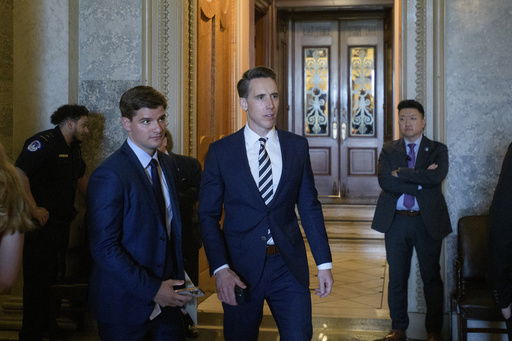In a surprising turn of events that has reverberated through the halls of Capitol Hill, President Donald Trump publicly denounced Senator Josh Hawley of Missouri, labeling him a “second-tier senator” after a significant bill proposing to ban stock trading by members of Congress, the president, and the vice president gained bipartisan traction. This sharp rebuke underscores the ongoing tensions within the Republican party regarding financial transparency and internal political maneuvering, even as the proposed legislation makes headway.
The catalyst for Trump’s ire was the advancement of Hawley’s bill, officially known as the “Honest Act,” through a crucial committee vote. Despite the former president’s objections, the proposal garnered significant bipartisan approval, showcasing a rare moment of unity on an issue that has long plagued public trust in elected officials. The bill’s progression highlights a growing momentum for stricter financial ethics among lawmakers, a sentiment widely shared by the American public.
Trump’s characterization of Hawley as “second-tier” is indicative of his continued attempts to exert influence over GOP senators, often through public pressure, to align with his political agenda. This incident is not isolated; it follows previous instances where Trump has openly criticized members of his own party for perceived deviations from his line. Such public admonishments reveal the complex dynamics and power struggles at play within the Republican landscape.
The Honest Act itself proposes a comprehensive ban on members of Congress, the president, the vice president, and their spouses from holding, buying, or selling individual stocks. It builds upon earlier proposals by Hawley that had a narrower focus on lawmakers, now expanding its scope to include the executive branch. This expanded reach signals a more ambitious attempt to address concerns about potential conflicts of interest and insider trading, which have been a recurring issue in public discourse.
The push for such legislation comes amidst longstanding public dissatisfaction with the perceived ability of elected officials to profit from their positions. Instances of lawmakers making timely stock trades based on non-public information, particularly during critical national events like the COVID-19 pandemic, have fueled calls for reform. The Honest Act aims to close loopholes in existing insider trading laws that do not always apply to the unique nature of information accessible to legislators.
If enacted, the bill would immediately prohibit covered elected officials from buying stocks and impose a 90-day ban on selling stocks after its enactment. Furthermore, it mandates that these officials divest from all covered investments, though this requirement would only commence at the beginning of their next term in office, effectively shielding former President Trump from immediate compliance. This phased implementation aims to provide a transition period while ensuring long-term accountability.
During the committee discussions, attempts were made to introduce amendments that would have exempted the president, vice president, and their families from the ban. Notably, Senator Rick Scott of Florida proposed such an amendment, as well as another that would have required a report on the Pelosi family’s stock trades. However, these amendments were defeated, with Senator Hawley joining Democrats to block them, underscoring his commitment to the broad application of the bill.
Senator Gary Peters of Michigan, the top Democrat on the panel and a key collaborator on the Honest Act, expressed optimism about the bill’s prospects, stating that its passage would prevent “bad actors from taking advantage of their positions for their own financial gain.” While House Speaker Emerita Nancy Pelosi’s office maintained that she personally does not own stock, the debate surrounding her spouse’s much-watched trading activities highlights the public scrutiny that high-profile officials face regarding financial transparency.
This latest clash over stock trading is part of a broader pattern of Trump attempting to pressure GOP senators on various issues. Earlier, he publicly urged Senator Chuck Grassley to abandon the Senate’s long-standing “blue slip” custom, a practice that ensures bipartisan support for judicial nominations. These repeated interventions reveal Trump’s consistent strategy of publicly challenging and influencing members of his party to conform to his political vision.






Leave a Reply